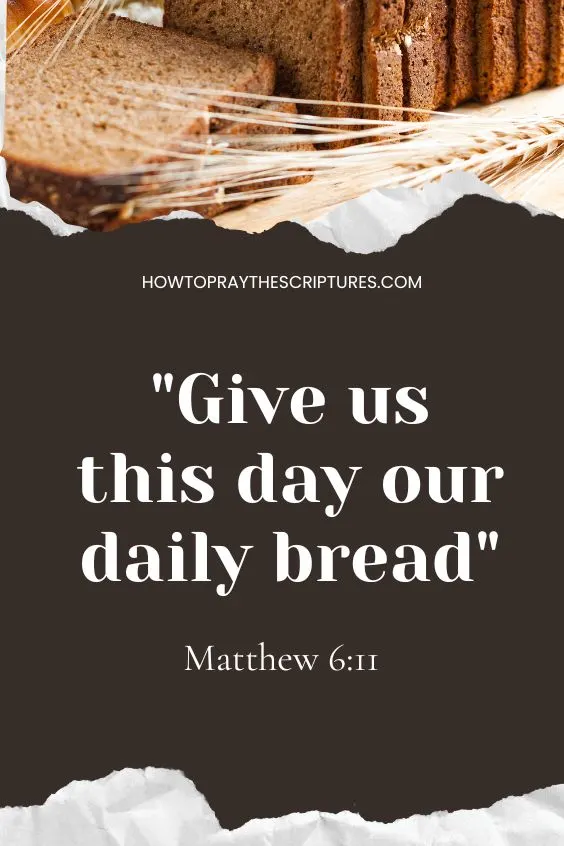This is a question that stirs curiosity and reflection. We’ve all been there. Sitting down to a meal, we pause for a moment of gratitude but sometimes struggle with finding the right words.
This isn’t just about saying grace before meals. It goes deeper than that. We’re talking about acknowledging our dependence on divine provision, expressing heartfelt thanks, and seeking guidance in our choices related to food.
The best prayer for food isn’t merely reciting words. It’s an act of faith and appreciation; an intimate conversation with God in which we recognize His blessings with every morsel we consume.
The Art of Saying Grace: Understanding Food Prayers in Christianity
Praying before meals often referred to as “saying grace,” is a long-standing tradition deeply rooted within the Christian faith. But where did this practice originate? And why do we continue it today?
Origins of Saying Grace
In tracing the roots of mealtime prayers in Christianity, one doesn’t have to look further than biblical times. Jesus himself set this example when he blessed loaves and fishes (Matthew 14:19). The early church continued with this custom; Paul’s actions recorded in (Acts 27:35 And when he had thus spoken, he took bread, and gave thanks to God in presence of them all: and when he had broken it, he began to eat.) serve as evidence.

What Is the Best Prayer for Food? A Divine Mealtime Guide
Variations in Food Prayers Across Traditions
- Catholic families commonly use traditional dinner prayers such as “Bless Us, O Lord,” asking for divine blessings on both their food and those who partake of it.
- In contrast, Protestant denominations may encourage more spontaneous expressions tailored to specific circumstances or needs during supper time.
Praying for Provision and Abundance
The act of beseeching for provision, a regular supplication in Christianity, demonstrates our reliance on the Almighty as the giver of all that is required to sustain life. This includes not only physical sustenance but also spiritual nourishment.
In this context, it’s essential to understand that “provision” goes beyond just mealtime prayers or dinner fellowship with the Father. It encompasses every aspect of our lives for which we need God’s blessing and abundance.
Jesus taught us to pray, saying “Give us this day our daily bread” (Matthew 6:11). Here are some insights into what Jesus meant by these words:

What Is the Best Prayer for Food? A Divine Mealtime Guide
The Importance of Praying for Provision
This part of the Lord’s Prayer acknowledges that everything good comes from above (James 1:17 Every good gift and every perfect gift is from above, and cometh down from the Father of lights, with whom is no variableness, neither shadow of turning.). By asking God for our daily bread – be it food blessed at supper or wisdom required during challenging times – we acknowledge His sovereignty over all aspects, including larger resources meant for survival.

What Is the Best Prayer for Food? A Divine Mealtime Guide
A Model for Prayers from The Lord’s Prayer
In Matthew 6:11 (NIV), Christ teaches believers about seeking provisions through prayer using simple yet profound words, “Give us today our daily bread.” These words serve as guidance for framing prayers around meals.
Seeking God’s Guidance
The pursuit of daily sustenance is a universal endeavor, and as Christians, we often turn to prayer in this quest. Our faith teaches us that all good things come from the Lord (James 1:17), including our meals or “daily bread.” The Bible encourages us to pray for what we need with unwavering faith.
Jesus’ words in Matthew 7:7, “Ask, and it shall be given you; seek, and ye shall find; knock, and it shall be opened unto you,” provide an outstanding instruction when praying about food supply.
The Importance of Seeking Divine Direction
When seeking divine direction regarding food provision, physical nourishment isn’t our only concern. We also strive for spiritual wisdom. Proverbs 3:5-6 advises us not only to trust in the Lord but to lean into His understanding while acknowledging Him so He may direct our paths.
This guidance extends beyond merely asking God for help during difficult times. It involves relying on His infinite wisdom rather than solely depending on human knowledge or resources.
A Prayer Model Based on Scripture
An effective model could include recognizing your dependence upon God’s providence based on Acts 17:28 (“For in him we live…”). You can then request His guidance using Psalms 32:8 (“I will instruct thee…”) before expressing confidence in His ability through Philippians 4:19 (“But my God shall supply…“).
Navigating with Faith Through Life’s Challenges
In periods of scarcity or difficulty in accessing needs due to circumstances such as natural disasters or economic downturns, prayers rooted deeply within biblical truths become especially crucial. In these moments, it is important to seek not only immediate relief but also discernment—knowing how to best navigate life’s challenges while upholding Christian values of honesty, integrity, and compassion toward the suffering of others as well (Romans 12:17-21).
Thanking God for His Blessings
Acknowledging the goodness of our Divine Creator is an essential element in Christianity. It’s through this acknowledgment that we recognize his kindness, mercy, and abundant provision. We offer up our faith in His future actions, along with our appreciation for what He has already done. This includes prayers over meals as well as larger prayers meant to cover all aspects of life.
Expressing Gratitude for Past Provision
In scriptures like Philippians 4:19, Paul confidently states that God will supply all our needs according to His riches in glory by Christ Jesus, reinforcing the importance of acknowledging past provisions during mealtime conversations with Him.
This assurance should stir up feelings akin to dinner fellowship and father-like joy within us because it serves as an affirmation that every good thing we have comes from above.
An attitude filled with gratitude toward our heavenly Father enables one to appreciate His gifts even before they manifest physically; thereby cultivating faith, which Hebrews defines as substance hoped for and evidence of things not seen (Hebrews 11:1 Now faith is the substance of things hoped for, the evidence of things not seen.).

What Is the Best Prayer for Food? A Divine Mealtime Guide
Giving Thanks in Advance Through Faith
Apart from thanking God for past provisions, another biblical principle involves giving thanks even before seeing prayers answered. This form of prayer constantly demonstrates trust and confidence in God’s ability, including in food-related matters such as daily bread or special feasts.
An example can be found when Jesus fed five thousand people with just five loaves of bread and two fish (Matthew 14:13-21). Before distributing the food, He first gave thanks, showing us how believing beforehand allows heavenly blessings to flow freely into our lives.
Praying for Wisdom and Discernment
The Scriptures remind us that wisdom is a principal thing, so we should strive to acquire it (Proverbs 4:7). This applies even to our food choices. Our food choices can have a major impact on our health, so seeking divine guidance is an important part of making wise decisions. “If any of you lacks wisdom, let him ask God, who gives generously without reproach” (James 1:5). As Christians seeking healthier lifestyles through wise food choices, praying for divine guidance becomes an essential part of the process.
Seeking Divine Guidance in Food Choices
Incorporating prayers into your meal planning or diet regimen involves asking God for discernment concerning which foods will best nourish your body. It’s not just about avoiding unhealthy options but also about understanding how different nutrients work together to support good health.
Philippians 4:6-7 instructs us not to be anxious about anything but to present every situation before God through prayer with thanksgiving. Applying this principle concerning dietary needs could lead to peace surpassing human comprehension, guarding both heart and mind against poor eating habits.
Honoring Our Bodies as Temples of the Holy Spirit
We’re reminded by Paul in 1 Corinthians 6:19-20 that our bodies are temples of the Holy Spirit, given by God Himself; therefore, we have to honor Him with our bodies by maintaining physical wellness, including proper nutrition. We need His help resisting tempting yet harmful diets while embracing healthier alternatives instead. Prayers requesting strength during such times might reference scriptures such as Psalm 28:7, where David acknowledges the Lord as his strength and shield, enabling him to trustfully rely upon His help and ultimately leading to joyful triumph over the challenges faced.
Praying for Protection from Harmful Food Sources
In today’s world, it can be tough to recognize which food sources are secure and beneficial. As Christians seeking a healthy lifestyle, we can navigate this challenge through prayer by invoking divine protection against harmful foods. Consuming unhealthy or potentially dangerous foods doesn’t align with this mandate.
Biblical Foundation for Prayers Against Harmful Foods
We find in Mark 16:18 an assurance from Jesus Christ Himself. This verse metaphorically alludes to the ability of faith to overcome life’s dangers, including harmful substances.
Such assurances form the basis upon which we pray against consuming unhealthy foods.
A Prayer Model Against Detrimental Foods
Psalm 91 offers us guidance on how one might structure prayers around this topic.
Adapting Psalm 91 specifically toward praying against harmful food could look like this:
Heavenly Father, You are my refuge and my strength. As I am about to eat this meal, may the Holy Spirit sanctify this meal and make it safe for me and my family, in Jesus’ name.
Conclusion
Praying for nourishment is more than a mere custom, it’s an expression of trust and appreciation. It’s about recognizing God as the provider of our daily needs.
We’ve learned that asking for provision and abundance is key in these prayers. We are not only praying for sustenance but also acknowledging that all good things come from above. In seeking divine guidance, we express our desire to make ethical choices when procuring food. This reflects our commitment to live according to His will.
Expressing thanks for blessings already received fosters a heart of appreciation and reinforces our trust in God’s providence even before we see the answer to our prayers. The wisdom sought in prayer aids us in making discerning decisions regarding food, and this promotes healthful living grounded on biblical principles.
We pray, too, for protection against harmful food sources, underlining the importance of physical well-being along with spiritual growth.
Finally, we end with expressions of gratitude, a fitting close that encapsulates all aspects covered by this powerful mealtime ritual.
So, what is the best prayer for food? It’s one that encompasses provision, guidance, thanksgiving, wisdom, protection, and deep-seated appreciation.